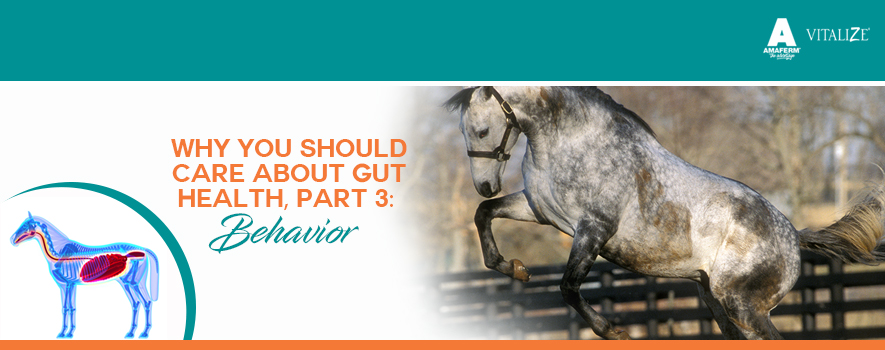
We know gut health has a big impact on digestion and absorption of nutrients and the body’s immune system, but more recent research presents another interesting connection between gut health and behavior. In one sense, it is easy to understand this connection. Your horse, for example, acts unhappy and may be more difficult to train if he has ulcers. In this case the discomfort of the ulcers causes poor behavior.
But, there is an even more intimate link between gut health and behavior. In the words of T.G. Dinan, “Gut microbes are part of the unconscious system regulating behavior.” This connection is referred to as the gut-brain axis. Although you may not have realized it, nearly each and every one of us has first-hand experience with the gut-brain axis. Ever felt your stomach doing flip flops before a stressful event? That response is a great example of communication between the brain and the gut.
This communication takes shape in many different ways. Perhaps surprising to most of us, there is actually a direct physical connection from the gut to the brain called the vagus nerve. In addition, the gut and brain also communicate with one another via hormones or neurotransmitters. You may have heard of serotonin before, a neurotransmitter that helps maintain a good mood. Serotonin is well known as a neurotransmitter found in the brain. However, scientists believe nearly 90% of all serotonin is produced in the gut, making the gut a key player in behavior!
The gut also produces over 40 other neurotransmitters that are also found in the brain. The more we research the gut-brain axis, the more validity there is to gut feelings! In fact, researchers are beginning to find more and more associations between the types of microbes living in the gut and conditions like anxiety, depression and mental illness that may negatively impact behavior. The main association between theses and gut health is called dysbiosis, a term referring to an increase of bad gut microbes and a decrease of good gut microbes. Dysbiosis may be caused by stress, ingestion of toxins, overfeeding of sugars, antibiotics or other medications like NSAIDs. You can help your horse avoid gut dysbiosis through good management practices and by feeding a prebiotic like Amaferm®, which is found in all Vitalize® products.


